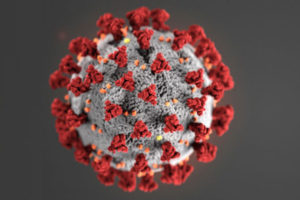Ghanaians urged to guard themselves against COVID-19 until nation attains herd immunity
 The Director for Public Health at the Ghana Health Service, Dr Franklin Aseidu-Bekoe, says Ghanaians need to keep observing the COVID-19 prevention protocols and protect themselves from contracting the virus until the nation attains herd immunity.
The Director for Public Health at the Ghana Health Service, Dr Franklin Aseidu-Bekoe, says Ghanaians need to keep observing the COVID-19 prevention protocols and protect themselves from contracting the virus until the nation attains herd immunity.
He said in an interview with the Ghana News Agency (GNA) that although the World Health Organization (WHO) had declared that COVID-19 was no longer a global health emergency, countries with low population immunity might not be out of the woods yet.
Scientists and medical experts have estimated that at least 94 per cent of a population be vaccinated and immune to interrupt the chain of the coronavirus transmission.
In Ghana, data on the Ghana Health Service (GHS) COVID-19 Update website showed that as of April 30 this year, about 11 million people, representing 57 per cent of the nation’s 18.2 million target have been fully vaccinated.
The data showed that presently, only 32.9 per cent of the total targeted population of persons 18 years and above have been fully vaccinated.
According to the website, a total of 24,941,992 doses of COVID-19 vaccines have been administered within the same period. Out of that, about 14 million people representing, 74.2 per cent of the 18.2 million targets have received a first dose.
Dr Asiedu-Bekoe said to help boost the population immunity, the GHS would in July launch another mass vaccination campaign to get more persons vaccinated.
He said the GHS was also developing a COVID-19 Vaccination Integration Plan to ensure that COVID-19 vaccination was made part of the routine vaccinations, noting that “this means that everyone can walk into a health facility to get a COVID-19 jab.”
The Director for Public Health encouraged individuals who were yet to be vaccinated against the virus to get a jab and for those who had been vaccinated already to get the booster shots.
He said Ghana was still recording COVID-19 cases, “but there are no severe cases now.”
“If people want to see COVID-19 as a normal disease then we need to attain herd immunity so that even those who contract it would have mild complications. If the immunity is low and we are not taking precautions then infections are likely to be severe,” he said.
Herd immunity, also known as ‘population immunity’, according to the WHO is the indirect protection from an infectious disease that happens when a population is immune either through vaccination or immunity developed through previous infection.
The WHO supports achieving herd immunity through vaccination, not by allowing a disease to spread through any segment of the population, as this would result in unnecessary cases and deaths.
The WHO said herd immunity against COVID-19 should be achieved by protecting people through vaccination, not by exposing them to the pathogen that causes the disease.
It said to safely achieve herd immunity against COVID-19, a substantial proportion of a population would need to be vaccinated, lowering the overall amount of virus able to spread in the whole population.
“One of the aims with working towards herd immunity is to keep vulnerable groups who cannot get vaccinated due to health conditions like allergic reactions to the vaccine safe and protected from the disease,” it said.
The percentage of people who need to be immune in order to achieve herd immunity varies with each disease.
For example, herd immunity against measles requires about 95 per cent of a population to be vaccinated, the remaining five per cent will be protected by the fact that measles will not spread among those who are vaccinated. For polio, the threshold is about 80 per cent.
President Nana Addo Dankwa Akufo-Addo in his 29th address to the nation on measure taken against the coronavirus reiterated the announcement made by WHO that COVID-19 was no longer a public health emergency of global concern, saying “In other words, we can now breathe that collective sigh of relief,”
“The emergency is over, and we can safely lift many of the oppressive restrictions we have had to endure, we can shake hands, we can hug, we can visit, and we no longer have to wear masks,” he said.
Dr Asiedu-Bekoe said what this meant was that the nation would no longer focus on having funds to fight the virus but would rather inculcate treatment of the disease into exiting health systems.
He advised Ghanaians to keep washing their hands with soap under running water as it prevented them from contracting COVID-19 and other infectious diseases. He also urged all to put on a mask when at a place with poor ventilation.
Coronavirus disease (COVID-19) is an infectious disease caused by the SARS-CoV-2 virus.
Most people infected with the virus experience mild to moderate respiratory illness and recover without requiring special treatment. However, some will become seriously ill and require medical attention.
The best way to prevent and slow down transmission is to be well informed about the disease and how the virus spreads, vaccination, wearing a properly fitted mask, and washing your hands or using an alcohol-based rub frequently.
The virus can spread from an infected person’s mouth or nose in small liquid particles when they cough, sneeze, speak, sing or breathe.
This report was made possible with technical support from the Center for Science and Health Communication (CSHC) and funding from the National Research Foundation, South Africa.
Source: GNA
